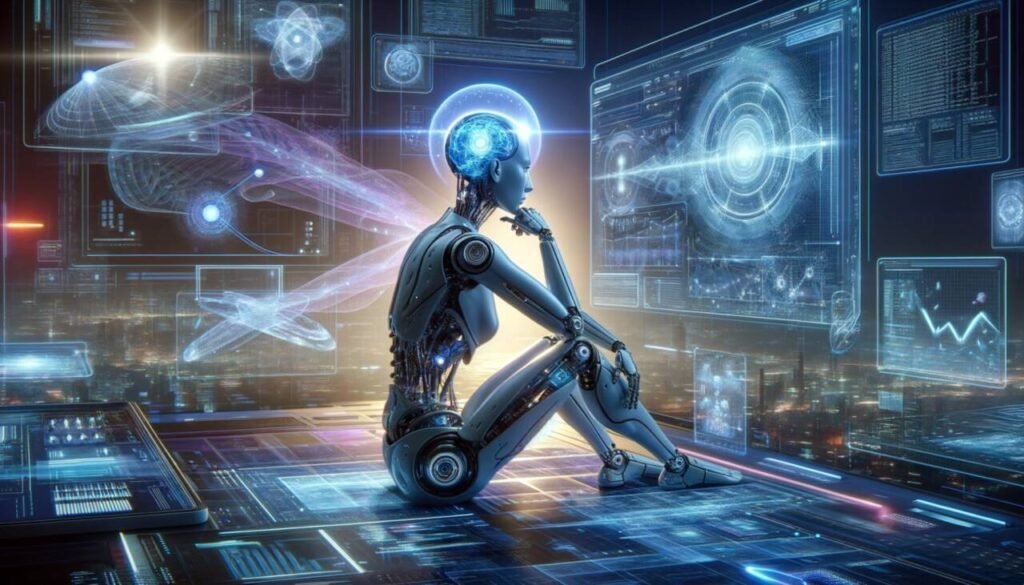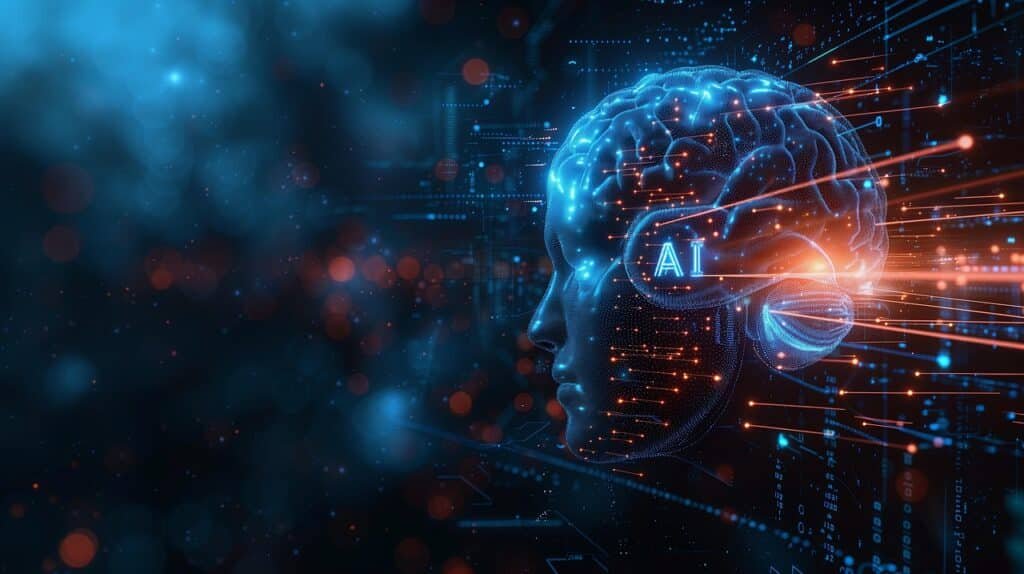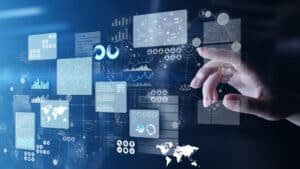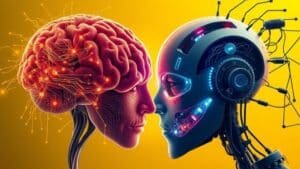Artificial intelligence is no more a sci-fi thing now, as it is embedded in your phone, your car, and even your government decisions. Today, it can compose music, perform surgeries, and help win wars. AI is no longer a thing of the future but your very present foundation. But artificial intelligence is that tree of night-blooming jasmine that definitely gives a fresh fragrance of convenience, but also attracts the snakes of harmful disadvantages. We will be seeing both the light and dark sides of AI, i.e., the advantages and disadvantages of artificial intelligence.
What is Artificial Intelligence?
It is a branch of computer science by which machines can perform tasks that require human intelligence. Work that requires immense human involvement, like thinking capability, reasoning ability, learning, and perceiving, along with decision-making. All of this can be done by machines today, just by applying artificial intelligence. Unlike traditional software, which could only fix errors or just predict the next word for your text, AI systems can perform more complex tasks by adapting data and autonomously improving their performance. They act how humans think while solving a problem and then learning from it (loop systems). But their speed, scale, and precision of computing power surpass human capacity.
Attributes of AI
- Machine learning (ML)
- Natural language processing (NLP)
- Computer vision
- Neural networks & deep learning
- Automation & robotics
- Predictive analytics
- Cognitive computing
- Adaptability
Pros & Cons of AI: Overview
| Advantages of Artificial Intelligence | Disadvantages of Artificial Intelligence |
| Automation and Efficiency | Unemployment Caused by Automation |
| Enhanced Decision-Making | Algorithmic Bias and Lack of Transparency |
| Accelerated Innovation and Discovery | Dual-Use and Misuse of Technology |
| Personalization and Accessibility | Privacy Erosion and Surveillance Risks |
| Safety and Precision | Overreliance and Systemic Failures |
Advantages of Artificial Intelligence
1. Automation & Efficiency
Automation is one of the majorly appreciated upper hand of AI. It is super helpful in handling routine and time-consuming tasks with unmatched correctness and speed. This AI advantage is most useful in sectors like supply chain management, logistics, and repetitive marketing tasks. It increases efficiency as people focus on more important and high-value tasks. Beyond productivity gains, automation allows smooth processing and quality with agility in catering to market demands.
2. Enhanced Decision-Making
Artificial intelligence is significantly improving decision-making across sectors like healthcare, finance, climate science, and even the army. It is because AI has enabled highly data-backed predictions, digital insights, and dashboards. It is much more convenient and easier to determine future outcomes, which builds a ground for strategic planning to make better and more profitable decisions.
3. Innovation & Discovery
AI has become a driving force in doing things in an out-of-the-box manner. It gives more time for creative thinking by handling data and logic faster than any human. In healthcare, drug discovery can be done by AI that understands molecular interactions. The generative AI is a go-to tool in fields like filmmaking, music, photography, and many other art forms. It can handle complicated stimulations and experiments and has made research cycles much shorter and efficient.
4. Personalization & Accessibility
Another advantage of AI is that it has enabled high-level personalization, from apps to services to websites to ads; everything is made-for-you these days. It is because AI works by feeding on immense amounts of data, and that’s how companies leverage customer profiles to provide a tailored experience.
Also, AI has improved accessibility for people with disabilities. With its features like voice assistance, smart hearing aids, and computer vision, it helps people to interact with the world more easily.
5. Safety & Precision
AI is helping perform risky tasks more safely and securely. Surgical robots are one example that helps doctors operate on patients with incredible accuracy. AI in self-driving cars is great at avoiding accidents and has faster reflexes than humans. In industries like aviation and manufacturing, AI-powered constant monitoring is saving accidents and failures.
All this concludes in fewer errors and better safety.
Related: What Is Paid Search Intelligence? Know All About It
Limitations of Artificial Intelligence

1. Unemployment Caused by Automation
Definitely, automation is a great way to do things efficiently and but as these tasks were performed by humans, now their jobs are being displaced, especially those of the routine workers. To stay relevant in the job market, people must acquire new skills. This shift has brought uncertainty and economic pressure for workers.
2. Algorithmic Bias & Lack of Transparency
AI systems rely on data; they learn and understand things from the data provided to them. If that data itself is biased, there are high chances of unfair and discriminatory outputs. Also, the AI decisions are hard to comprehend at times, like, black box AI system whose internal workings can not be understood by humans. This makes transparency difficult, and the reasoning for why this decision was made.
3. Dual-Use & Technological Misuse
There are a number of misuses of artificial intelligence that have been listed. Some of them are deep-fakes, automating cyberattacks, and designing harmful & destructive materials. If not handled with care and proper rules and regulations, it can be used for harmful purposes.
4. Privacy & Surveillance Risks
How do you think AI is supporting such a high level of precision and personalization? Very obviously, with the huge amounts of personal data sets for training but it can also invade privacy. Governments and companies can easily track people closely, which raises concerns about surveillance and control. There have been multiple real-life cases of the same.
5. Overdependency & Systemic Failures
Humans are the most intelligent and powerful machines on earth. But as we all know, if a machine is put to rest for a prolonged period, it loses its mechanical ability to work. The same is with humans and AI, every small or big decision is relied on AI, which can lead to a stoppage of questioning and reasoning abilities of humans.
All the more, AI has made integration so seamless that if AI systems fail in one place, it can be a widespread problem across sectors and departments. The overreliance makes systems fragile.
Related: 50 Years of Artificial Intelligence: From Imagination to Innovation
Ethical Issues with AI
- There are various ethical challenges with AI, mainly algorithm biases, privacy violations, and a lack of transparency. A study in 2018 revealed that the error rate for light-skinned males was 0.8% whereas it was as high as 34.7% for dark-skinned females. This is a clear issue of racism and gender disparity in commercial facial recognition AI systems.
- Across various health systems in the U.S., there was bias in prioritizing healthier white patients over sick black patients for additional care. Because the AI was trained on cost data and not care needs.
- AI chatbot maker Luka Inc. was fined €5.6 million, because it collected and used data without proper consent and not verifying users’ ages. Chatbot Replika was also involved, which had already faced restrictions for child safety issues.
How Does AI Impact Jobs and Employment?
Artificial intelligence is for sure transforming the global job market with automation, high precision, and efficiency. But it is not becoming a sole reason for unemployment, but instead it is pushing individuals and organizations to upskill and walk shoulder to shoulder with technological evolution. There is a rise in new roles of data scientists, robotics, and AI ethics.
The report from the World Economic Forum’s Future of Jobs highlighted that 83 million jobs could be displaced with AI and automation by 2027, but there is also a boom of 69 million new roles, particularly in technology-driven industries and green sectors.
Yes, repetitive manual jobs are for sure at high risk, but this AI shift is not completely replacing manpower, but reframing it in alignment with the digital age. People can not skip and run away from these persistent evolutions over the ages in every aspect of life. The cutthroat reality is to reskill and upskill the workforce.
Examples of Artificial Intelligence Advantages in Daily Life
| Area of Life | Example of AI Use | Benefit |
|---|---|---|
| Personal Assistance | Siri, Alexa, Google Assistant | Simplifies daily tasks like setting reminders, managing schedules, or controlling smart home devices. |
| Healthcare | AI-based diagnosis tools (e.g., IBM Watson Health) | Detects diseases faster and improves treatment accuracy. |
| Transportation | Autonomous vehicles, Google Maps | Enhances road safety and optimizes travel routes to save time and fuel. |
| Finance | Fraud detection algorithms, robo-advisors | Prevents financial fraud and helps users make smarter investment decisions. |
| E-commerce | Personalized recommendations on Amazon | Improves shopping experience with tailored suggestions. |
| Entertainment | Netflix and Spotify AI algorithms | Curates movies and music based on user preferences. |
| Education | AI tutors like Khanmigo or Duolingo AI | Offers personalized learning experiences and instant feedback. |
| Customer Service | Chatbots on websites | Provides 24/7 support, reduces response time, and improves customer satisfaction. |
| Smart Homes | AI-powered devices like the Nest Thermostat | Optimizes energy use and enhances comfort automatically. |
| Workplace Productivity | Tools like Grammarly or ChatGPT | Increases efficiency by automating writing, data analysis, and communication. |
In A Nutshell
Machine intelligence is now well woven into our daily lives, from daily chores to industry-level operations; we highly rely on AI for automation and efficiency. Artificial intelligence is beyond human capacities in terms of speed, accuracy, and simplifying tasks. But if not handled properly, it can be severely disadvantageous.
There are many examples of where mismanagement of AI has cost the users money and reputation. In a report by Oxford University Press, six in ten students felt that AI had also negatively impacted their skills in relation to schoolwork. A quarter said AI made it too easy to do the work for them, and one in ten believes it limits their creative thinking and impacts their creative writing.
The above information clearly shows that there are several advantages and disadvantages of artificial intelligence. While embracing advantages, it is essential to keep a balance of convenience and ethics. And keeping in mind that artificial intelligence is about empowering humanity, not replacing it.
Related: Top 5 Market Intelligence Platforms for B2B Success








